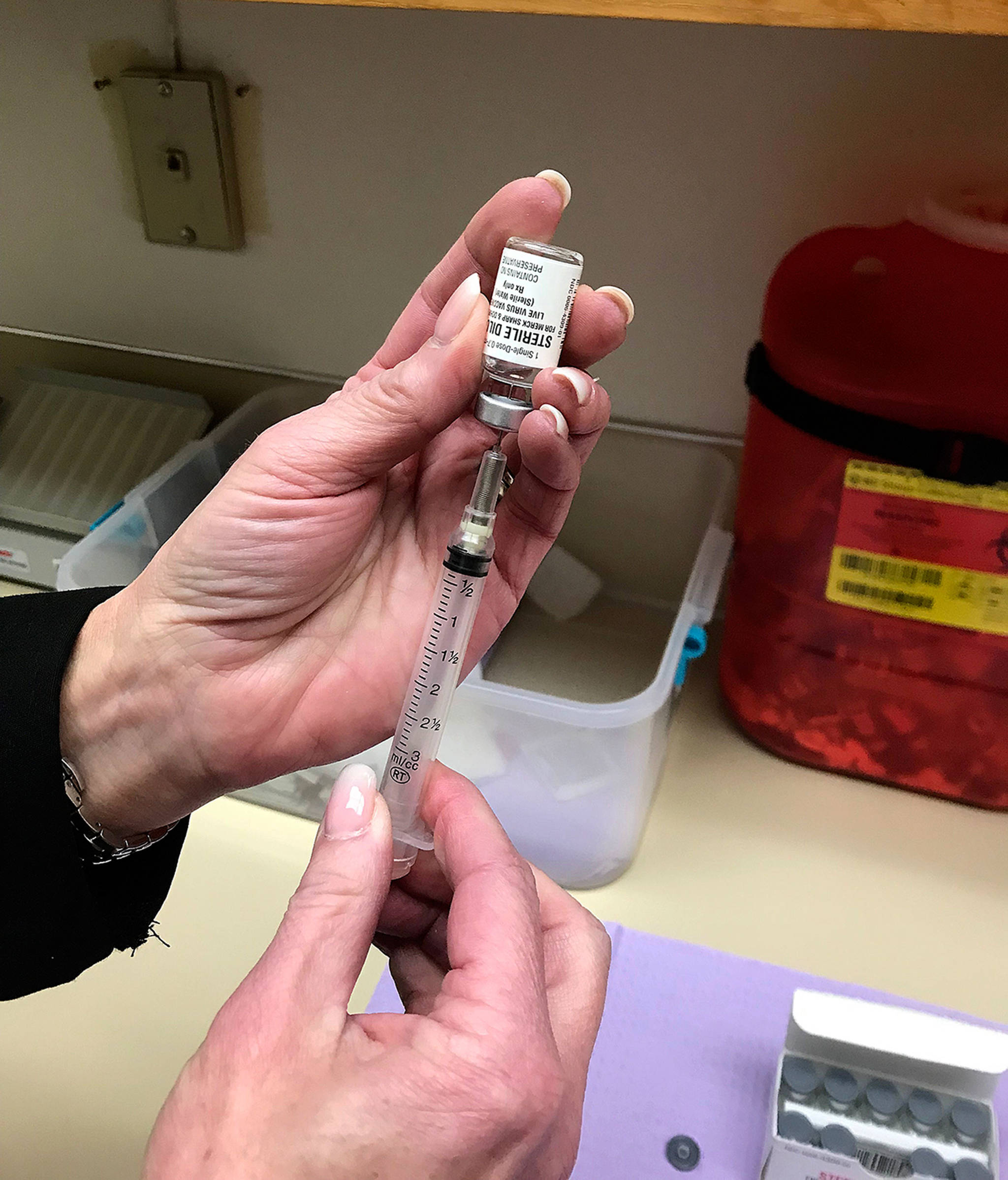Some areas of Washington state are experiencing a measles outbreak and it has put brighter lights on vaccination rates. In the cases of children who aren’t vaccinated, the focus is often on parents who choose — for medical, religious or philosophical reasons — not to have their kids vaccinated. But Karolyn Holden, director of Grays Harbor Public Health and Social Services, says that in many cases, the answer is a lot less complicated.
On the Washington State Department of Health website, it says children should complete a series of seven different vaccinations by the time they are 19 months old. Because multiple doses are required for some vaccinations, the recommendation comes out to 19 shots in total by the time the child is 19 months old.
The tight deadlines mean parents can get off-track, Holden said.
For Washington State in total, an estimated 59.9 percent of 19- to 35-month-olds got all their shots in time, according to data on the Department of Health website. Grays Harbor County was a little lower, with 56 percent estimated to receive all their shots in time.
In terms of the measles, mumps and rubella vaccine (MMR), the state has a better rate of immunization, with 80.3 percent of all sampled children having received the vaccination in time. Grays Harbor County was again a little lower, with an estimated 77.9 percent of sampled children having received the MMR shot on time.
There hasn’t been a formal study that answers why some Grays Harbor parents don’t vaccinate their kids on time since the county and state health departments conducted a survey in 2009. But Holden speculated that a lot of it has to do with parents simply falling behind for a variety of reasons.
“If parents aren’t able to make that happen on a routine basis, or they don’t do it, or they opt to not take any or all of the recommended vaccines in that visit, they fall behind,” said Holden.
Holden said in her experience, parents will agree to have several shots during a doctor visit, but skip getting other shots because they fear it will be too stressful on the infant. Because there needs to be a couple months between vaccinations, Holden said parents can’t just play catch-up to get all the vaccines.
Aside from getting children behind on vaccinations, Holden said research suggests having more doctor visits creates more stress on infants than getting more shots in a single visit does.
Holden said there are sometimes missed opportunities when children visit a doctor for other illnesses, and get off schedule when parents turn down vaccinations because the infant is sick with something else.
“There’s a fairly common myth that when your kid has an ear infection, they shouldn’t get a shot,” said Holden. “When a kid is really sick with a fever, you probably shouldn’t immunize them. But if they’re not that sick, and their immune system isn’t that busy, it really is recommended to immunize them. I think a lot of parents and providers either hesitate to provide vaccination when a child is mildly ill, or it doesn’t come up.”
In the 2009 report, 375 out of 1,228 infants in Grays Harbor County were sampled, aged 19 to 35 months. Only 6 percent of the parents and guardians said they had personal, philosophical or religious reasons to not give some immunizations to their children.
Other questions in the survey reveal other potential causes of the missed vaccines. The report shows that 47 percent of guardians don’t keep a copy of recommended immunization schedule at home. Seventy percent of guardians who didn’t get their kids vaccinated in time said they were delayed because the child was ill. It also notes 48 percent of guardians or someone they knew had to take time off of work to get their child’s shots, and 30 percent said it was difficult to take time off to go get the shots.
The only state requirements to get vaccinations are for kids enrolled in school or daycare facilities, and there are no laws that compel parents to get kids immunized outside of school.
And students can be exempted from vaccination requirements if parents or guardians sign a statement that they object to one or more vaccines based of personal, philosophical or religious beliefs. They can also get a medical exemption, which requires a doctor’s statement that certain vaccines should not be used on a child.
According to data from the Aberdeen School District, 92.3 percent of all district students completed required immunizations during the 2017-18 school year. There were 47 students who had some kind of vaccination exemption that year, out of 2,990 total enrollment, less than 2 percent.
In the Hoquiam School District, 36 students had their parents opt out of one or more vaccinations, compared to 1,467 students who are fully immunized, a little more than 2 percent
Even though there are some who opt out for personal reasons, Holden said she thinks they’re a small minority. “And I think they’re very loud, so they appear bigger than they are.”
Holden added that the price of vaccinations is not a real factor in why children are not vaccinated, and that most all health insurance covers those costs.



